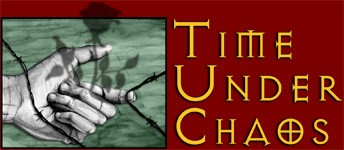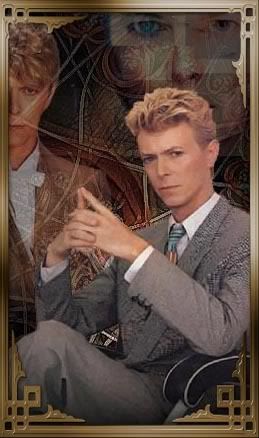
MandorIndex | Time Under Chaos | Non-Player Characters | Mandor "...I held it before me and put the others away, studying the blue eyes and the young, hard, slightly sharp features beneath a mass of pure white hair. He was dressed all in black, save for a bit of white collar and sleeve showing beneath the glossy tight-fitting jacket. He held three dark steel balls in his right hand." -- Prince of Chaos "The air was distorted between us, and when Mandor lowered his arms a dinner table covered with embroidered white linen came into sudden view between us, soundlessly, followed a moment later by a pair of facing chairs. The table bore numerous covered dishes, fine china, crystal, silverware; there was even a gleaming ice bucket with a dark twisted bottle within it." (Mandor claims to have spent much time on gourmet magic)-- Sign of Chaos  Life should have been much simpler for Mandor. He could have been the heir to Sawall and spent his days in quiet control of one of the most influential Great Houses of Chaos. That, alas, was not to be. Like Benedict, he would not allow the order of his birth to forge his destiny. Instead, he became a tutor and a power-broker, and someone whom Merlin came to rely on more and more. Almost by accident Mandor became Prime Minister, simply because Merlin could not trust anyone else. If Princess Fiona had accepted Mandor's suit, he would have happily remained in Chaos, but she married someone else. The experience embittered him, though as ever he never let on, not even to Merlin. Once in Amber, Mandor found that his many talents had free rein. He was a hero among his own people, and thanks to his thorough and ruthless purge of Amber's elite, in an unrivalled position. He set to delegating the tasks of government to competent and unswervingly loyal minor members of House Sawall while doing his best to keep his father and brother occupied in the Courts of Chaos. He also began raising up those of talent he discovered in Amber, and grooming them as agents and enforcers. He was under no illusions that while Prince Caine and Julian remained at large, Amber would never be secure. Given his skillful ambush of Amber's returning armies, many have found it strange that Mandor has had nothing to do with the armed forces since, delegating instead to generals from Chaos who are regularly rotated. These generals seem to regard the position as honorary, and apart from fruitless skirmishing with Julian's rangers they make no long term contribution to Amber's security. This has more to do with Chaosian etiquette than any lack of desire – Sawall is not one of the noted military houses and must make way for the Patrician houses, such as the Hendrakes, when it is seen as their sphere of influence. Mandor was never one to flout customs and has done much to promote the culture of his homeland despite the fact Merlin could hardly care less. For many people, it is Mandor, rather than Merlin, who is seen as the personification of the Chaosian regime. His influence and his style is stamped on the city, and everyone knows it is he, not the king, that has the final word on policy and its enforcement. In alleyways and out of the hearing of the government's informers, it is said that Mandor is far from the image of cultured gentleman he wishes to project. After all, he controls all the media, so who can say what the truth may be, save his closest advisors. His public appearances are rare, though it is thought he has taken Merlin's place at official functions on more than one occasion. In fact, it is said that Merlin's descent into hedonism is so complete he makes no executive decisions at all, and that it is Mandor's word that is law. Some say that it is Mandor who has fed Merlin's vices, and made him the man he now is, a shadow of his former energetic self. Still others whisper he has not given up on courting Princess Fiona, and regularly sends assassins to do away with his love rival. The rebels say that behind the mask is a paranoid man made mad by power and jealousy, who thinks nothing of killing anyone he perceives as a threat. The truth may be all or none of these things. |